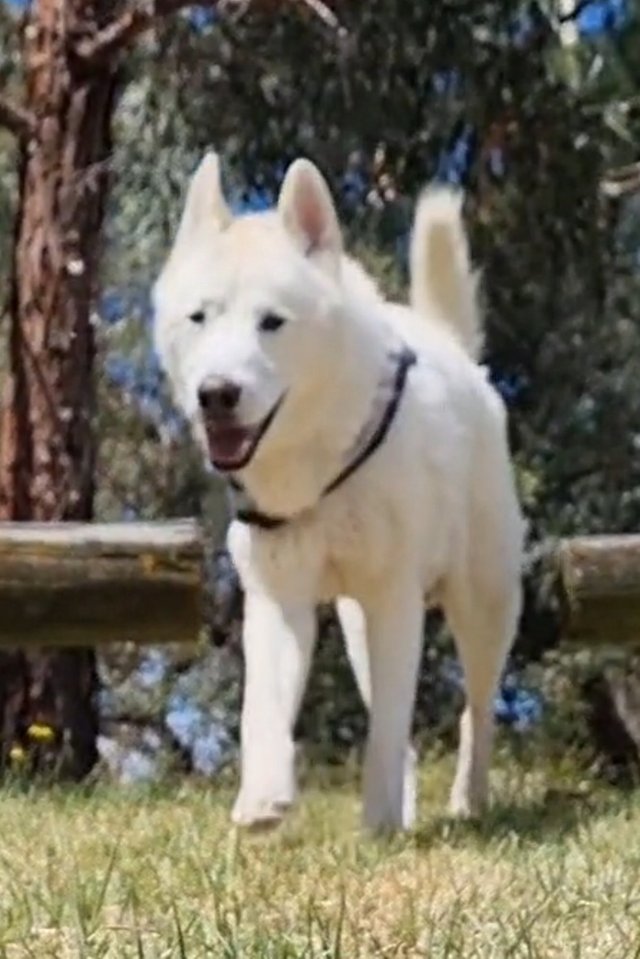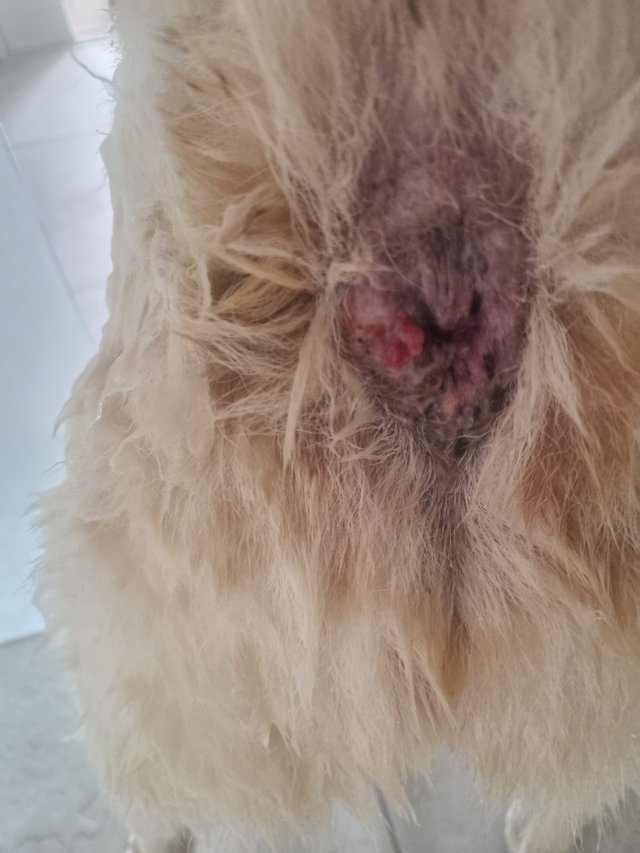Polar's Cancer Fight: A Turnaround with Hope on the Horizon!
.jpg)

Current Developments: After many weeks, we're back on track with weighing Polar's food, particularly the oil, to ensure his caloric intake aligns with our treatment goals. We've resumed weighing not just for precision but to maintain the discipline needed if further restrictions become necessary. Managing this type of cancer involves juggling several aspects, from meticulous wound care to ensuring his diet supports efficient healing without risking re-inflammation or digestive issues that could complicate recovery. The risks are manifold with this cancer; one significant concern has been the bleeding, where malignant blood could potentially affect surrounding healthy tissues, especially given Polar's history of licking the wound, which might theoretically spread the tumor. This concern was magnified by the unexpected biopsies Polar underwent before we fully understood the situation through extensive research.
Today, after all the recent hard work, I'm relieved to see Polar's tumor appears to be back well under control. It's hard to believe that just weeks ago, I was documenting its spread due to bleeding and inflammation. A couple of weeks ago, our vet expressed concern about how Polar would fare, but to her surprise, he was managing okay. She noted that the cancer appeared "less angry" than on the previous visit. At that point, I was desperate for another chance to get Polar back on track, feeling that complacency might have squandered our only opportunity, considering the aggressive nature of this cancer. It's clear now that his cancer is malignant; left unchecked, it spreads rapidly. However, it seems less enthusiastic when confronted with our comprehensive approach to combat it.

At this crossroads where we find ourselves again, there's caution in this celebratory event. While it's a time to celebrate this second chance, there's no room for complacency. Faith in the process and the potential for a cure has been unwavering, despite the occasional creep of worst-case scenario thoughts. End-of-life discussions and opinions that didn't offer hope were void, as faith held above all. The belief that somewhere on this earth, within the vast sea of available information, lies the key to managing and potentially resolving Polar's cancer remained strong. Ultimately, gratitude fills our hearts that Polar appears managed for now, with all signs pointing positively. There's hope for more time to thoroughly address this disease through this intense, methodical experience.
Following the global health crisis, where the introduction of new medical technologies led to outcomes like increased cancer rates that were anticipated by some, there's been a stark reminder of the complexities in modern medicine. This has heightened my resolve. After witnessing the personal impact of these events, there's more motivation than ever to define this blueprint through Polar. We aim to spread it like wildfire upon its success, offering an alternative path for those looking to explore different avenues in health management.
Treatment Strategy:
Fenbendazole: Polar has been on 222mg for seven weeks without adverse effects. In the eighth week, we transitioned him to 333mg for three days, and this past week (the 9th week), he moved to 444mg. We're preparing to start our 10th week this Monday, continuing with 444mg under vet supervision.
Ketogenic Diet: His weight has remained stable, which is a positive sign as we manage his diet alongside treatment. Dr. Thomas Seyfried has noted that in children and animals, where there's complete control over consumption and exercise, the ketogenic diet combined with the press-pulse protocol can work more quickly due to the ability to strictly manage these variables. The potential for quicker results in Polar's treatment, as suggested by Seyfried's research, gives us added hope. This is because in a controlled environment, we can ensure strict adherence to the diet, leverage the metabolic flexibility of younger or smaller animals, and apply the press-pulse dynamics with precision, potentially leading to more effective and faster cancer cell death while minimizing harm to healthy tissues.
Fasting: We've introduced 36-hour fasts post-fenbendazole cycles, with plans to extend to 48 hours. This is aimed at enhancing treatment efficacy and managing the tumor's growth by altering his metabolic state.
Ivermectin Cream (Soolantra): Introduced off-label on January 17th for twice-daily application to locally treat the tumor. This approach complements fenbendazole and the ketogenic diet, based on anecdotal evidence from pet skin conditions and human skin cancer testimonials. We'll monitor closely due to its primary use for human rosacea.
Press Pulse Schedule: Fenbendazole is administered for three days (Press Phase), followed by four days off (Pulse Phase) to support immune and liver health. This schedule aligns with the press-pulse therapy Seyfried advocates, which involves applying metabolic stress to cancer cells while allowing normal cells to recover.
Hormone Optimization: Discussed but put on hold due to lack of conclusive benefits for perianal tumors in dogs.
Oral Ivermectin: Agreed upon as a last resort if the disease cannot be brought under control with the current regimen of increased fenbendazole dosage, Soolantra cream, and fasting.
Holistic Support: Considering immune-boosting supplements and discussing pain management with vets to ensure Polar's comfort.
Monitoring: Regular vet visits, close observation for side effects, and potential imaging to track tumor changes.
We've agreed that the increased doses of fenbendazole, introduction of Soolantra Ivermectin cream, and fasting represent a sufficient step for now in our battle against Polar's cancer.
We're sharing this journey not as medical advice but as an insight into one pet's battle against cancer. Each step, from treatment adjustments to diet management, is made with veterinary consultation, emphasizing Polar's quality of life. The community's role in sharing knowledge and support has been invaluable.
Community and Vet Engagement: We keep detailed records for sharing and vet consultations, maintaining an open dialogue for any necessary adjustments.
This journey is about hope, exploration of treatments, and community support. We're cautious yet optimistic, always prioritizing Polar's health and well-being. Join us in this journey, share your knowledge, and let's work together towards a blueprint for canine cancer treatment.